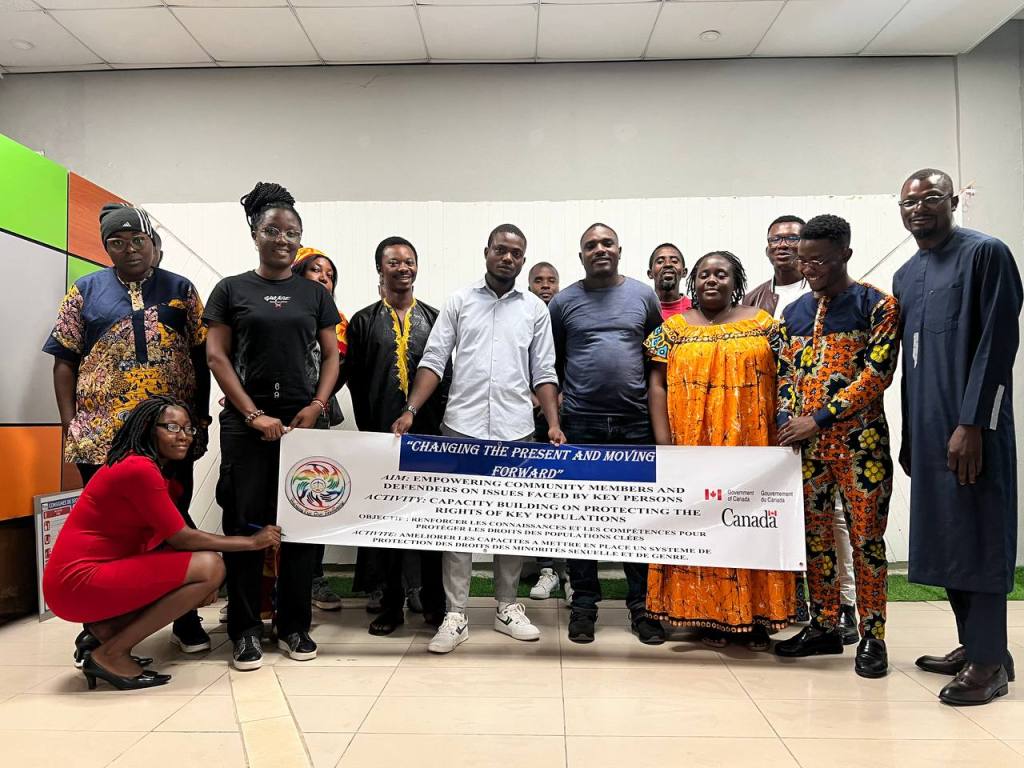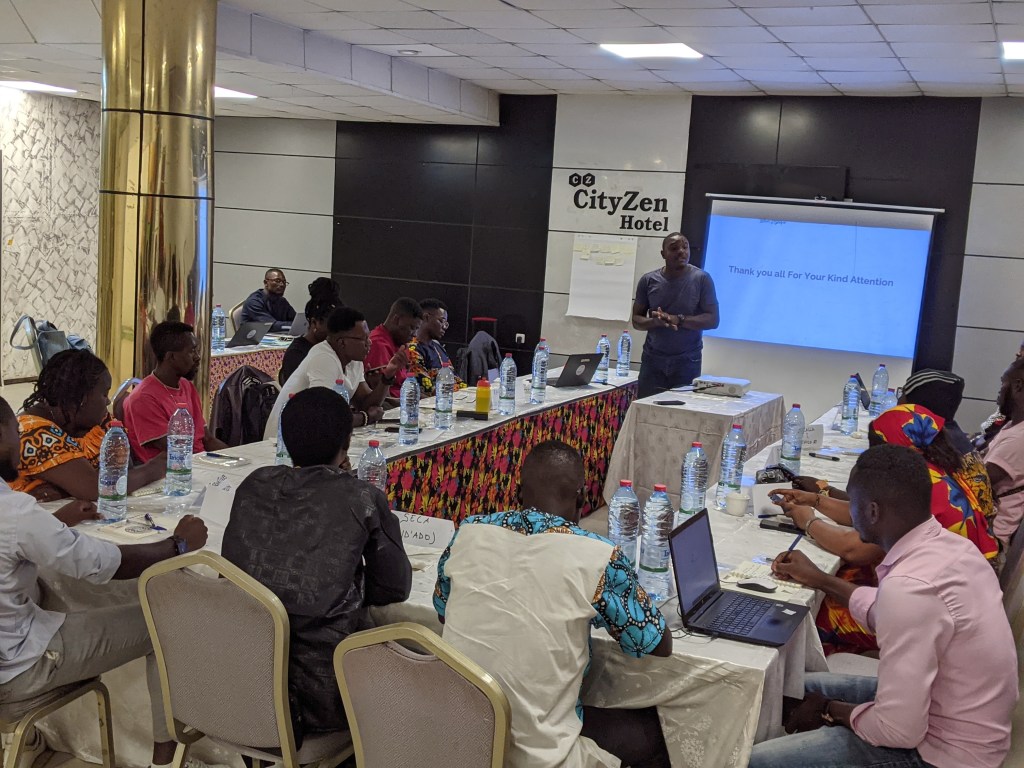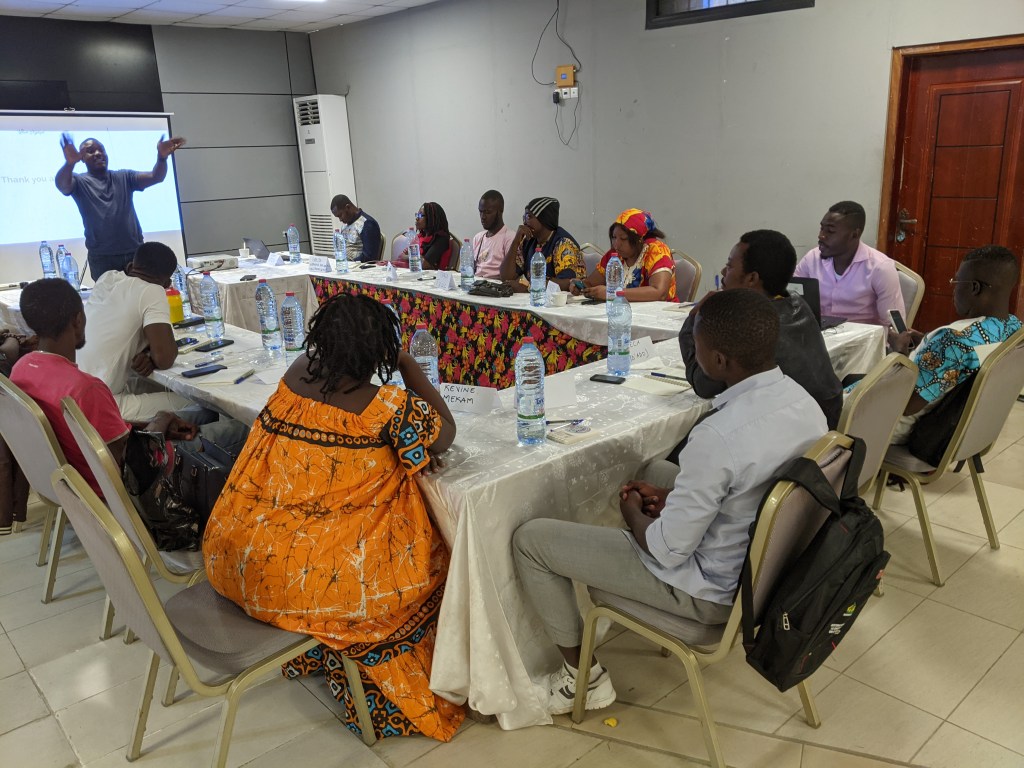Last week, we conducted a two-day training workshop under the project “Changing The Present and Moving Forward.” funded by the Canadian Fund for Local Initiatives (FCIL CAM). The focus of this workshop was to strengthen the understanding of activists working in the area of human rights to better understand national and regional human rights mechanisms and let them know when, how, and where to apply it in relation to their work within the community. The workshop had a particular emphasis on the multiple violence and human rights violations sexual and gender minority persons go through without getting justice in most cases when it does occur.

Training Highlights
The workshop, held on the 6th and 7th of October, provided a platform for 18 participants to acquire in-depth knowledge and build their capacity to navigate national, regional, and international human rights mechanisms. Various facilitators shared expert insights and conducted engaging presentations, empowering participants to advocate for the rights and well-being of sexual and gender minority persons more effectively.
The sessions covered a range of topics, including the Universal Declaration of Human Rights, regional instruments of human rights, United Nations treaties, and the African Charter on Human and Peoples’ Rights. Through interactive group work, participants tackled challenging tasks that encouraged critical thinking and problem-solving, fostering a deeper understanding of the subject matter.
During the training, participants were immersed in the importance of collective collaboration and effective documentation of cases related to gender-based violence. Recognizing the significance of documentation, participants were trained on various tools and techniques to accurately capture and record incidents. Additionally, the training covered the critical aspect of data security to ensure the protection of sensitive information. Participants learned about best practices for securing data online and preserving confidentiality.
Understanding Regional and International Mechanisms
A substantial portion of the training was dedicated to exploring national, regional, and international human rights mechanisms. At the national level, participants delved into the constitution and the jurisdiction of national human rights bodies, such as the National Human Rights Commission. The workshop also focused on various regional instruments, including the African Charter on Human and Peoples’ Rights, the Maputo Protocol, Resolution 275, and Resolution 552 of the African Charter, which affirms the different rights of sexual and gender minorities. Participants gained valuable insights into international human rights mechanisms, such as the Universal Declaration of Human Rights, international pacts, conventions, and treaties. The overarching objective of all these mechanisms is to safeguard the rights of individuals, regardless of their actual or perceived sexual orientation with a specific emphasis on sexual and gender minority persons, participants were guided through detailed discussions on human rights mechanisms at the regional and international levels. They explored the institutions, procedures, and strategies that can be leveraged to advance the rights of these groups, foster inclusivity, and combat discrimination/stigma.

The training sessions provided a comprehensive overview of the mechanisms available for addressing human rights violations, including the role of intergovernmental organizations, non-governmental organizations, and key advocacy tools. Participants gained valuable insights into strategic approaches, research methodologies, and effective communication strategies to amplify their voices and advocate for change.
Empowering Human Rights Defenders
One of the primary goals of the workshop was to empower human rights defenders and allies in the Littoral region. By equipping them with comprehensive knowledge and practical tools, we aimed to strengthen their ability to advocate for the rights of sexual and gender minority persons effectively. The training fostered a supportive network, creating opportunities for collaboration, knowledge-sharing, and the development of cohesive strategies.
Moving Forward
Throughout the workshop, participants were reminded of the need for continued efforts and collaboration beyond the workshop. They were encouraged to view the training as a launching pad rather than a conclusive endeavor. The challenges facing the advocacy for sexual and gender minority rights in Cameroon demand ongoing dedication and collaboration from all stakeholders. The training served as a call to action, inspiring participants to actively contribute to the advancement of human rights in their respective spheres.
Continued investment in the capacity-building and empowerment of human rights defenders, as demonstrated through this training workshop is essential for driving sustainable change in society. By equipping individuals with the necessary knowledge and skills, Working for Our Wellbeing strives to create an environment where the rights and dignity of sexual and gender minority persons are respected and protected.

Take-home message
Working for our Wellbeing is fully aware that overcoming these challenges requires sustained commitment and a united front. We remain steadfast in our support for participants and the wider community, creating an environment where the rights and dignity of all individuals, irrespective of sexual orientation are duly respected and protected. By continuing to build alliances, develop strategies, and seek tangible solutions, we can work towards a future that upholds the fundamental rights of all persons in Cameroon.
Closing remake
The workshop concluded on the 7th with a closing remark from the Executive Director of WFW. Expressing gratitude, the Executive Director thanked all participants for accepting the organization’s invitation and wholeheartedly engaging in the training. The Executive Director acknowledged the dedication and commitment demonstrated by each participant throughout the sessions and emphasized the importance of their involvement in the fight for sexual and gender minority rights.
With the training officially declared closed, participants departed for their respective destinations, carrying with them a renewed sense of purpose and determination. They were left equipped with valuable knowledge, practical skills, and a reinforced commitment to advocate for the rights of sexual and gender minority persons in Cameroon.
With the confidence ent that the training has empowered participants to make a meaningful impact in their communities. The organization stands ready to provide ongoing support, guidance, and a platform for continued collaboration among participants, ensuring sustained efforts in creating an equitable and inclusive society for all.
As the participants dispersed, they carried with them the collective energy and vision for a future where the rights of all individuals, regardless of their sexual orientation, are respected and protected. The conclusion of the training marked not the end, but rather the beginning of a new chapter in the fight for equality and social justice.
Conclusion
The two-day training seminar served as a significant step towards enhancing the understanding of regional and international human rights mechanisms among participants in the Littoral region. By fostering knowledge, collaboration, and empowerment, we are confident that this training will lead to effective advocacy, inclusive policy development, and positive social change for sexual and gender minority persons in Cameroon.
Through ongoing initiatives aimed at strengthening the capacity of human rights defenders and creating inclusive platforms for dialogue, Working for Our Wellbeing remains committed to the pursuit of justice, equality, and the protection of the rights of all individuals, regardless of their sexual orientation or gender identity.
